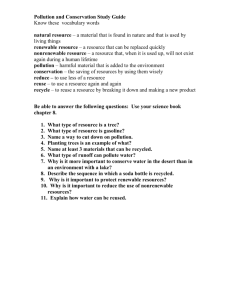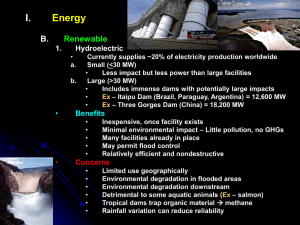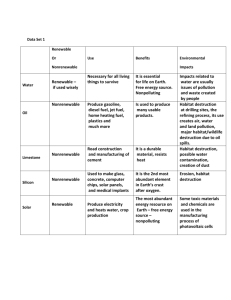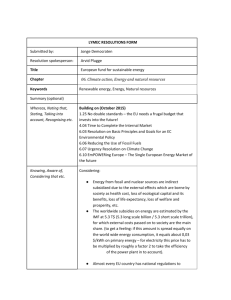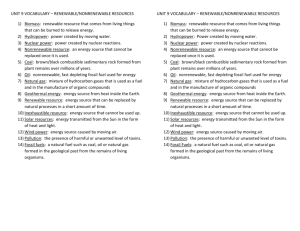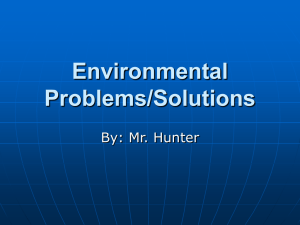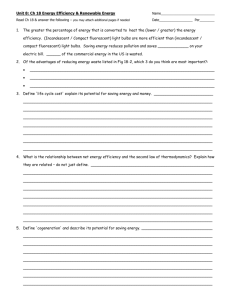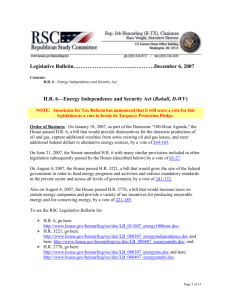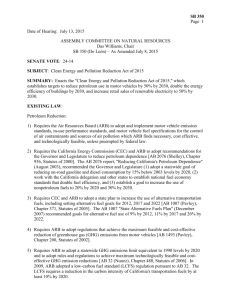JAC presentation to mtg (relevant local plan policies)
advertisement
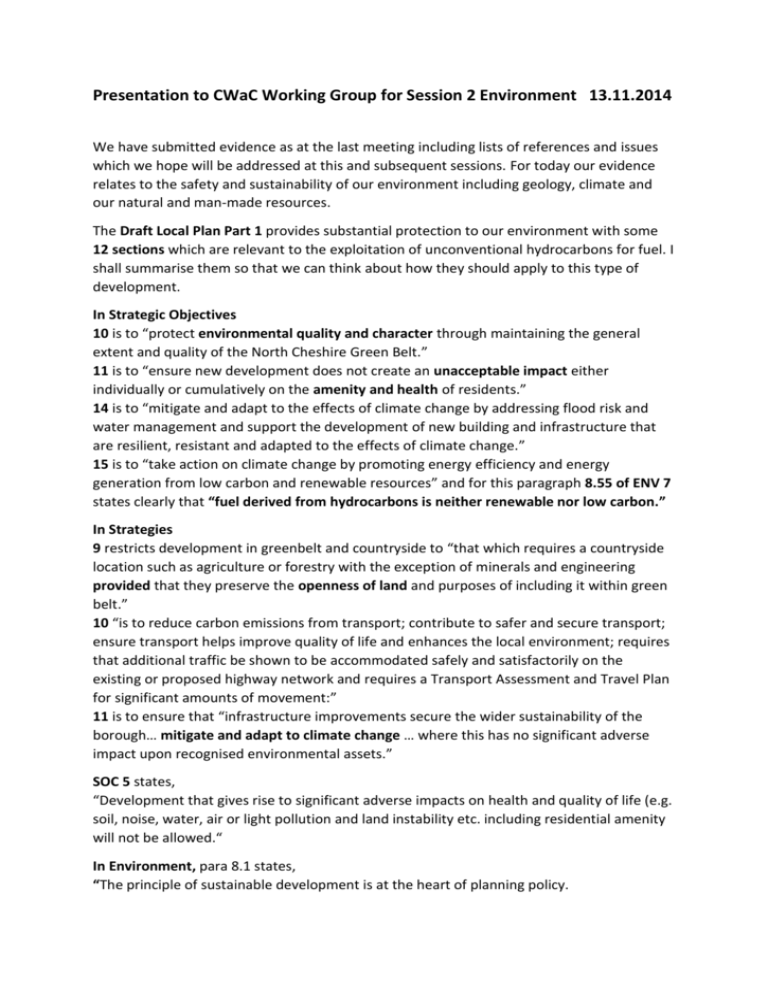
Presentation to CWaC Working Group for Session 2 Environment 13.11.2014 We have submitted evidence as at the last meeting including lists of references and issues which we hope will be addressed at this and subsequent sessions. For today our evidence relates to the safety and sustainability of our environment including geology, climate and our natural and man-made resources. The Draft Local Plan Part 1 provides substantial protection to our environment with some 12 sections which are relevant to the exploitation of unconventional hydrocarbons for fuel. I shall summarise them so that we can think about how they should apply to this type of development. In Strategic Objectives 10 is to “protect environmental quality and character through maintaining the general extent and quality of the North Cheshire Green Belt.” 11 is to “ensure new development does not create an unacceptable impact either individually or cumulatively on the amenity and health of residents.” 14 is to “mitigate and adapt to the effects of climate change by addressing flood risk and water management and support the development of new building and infrastructure that are resilient, resistant and adapted to the effects of climate change.” 15 is to “take action on climate change by promoting energy efficiency and energy generation from low carbon and renewable resources” and for this paragraph 8.55 of ENV 7 states clearly that “fuel derived from hydrocarbons is neither renewable nor low carbon.” In Strategies 9 restricts development in greenbelt and countryside to “that which requires a countryside location such as agriculture or forestry with the exception of minerals and engineering provided that they preserve the openness of land and purposes of including it within green belt.” 10 “is to reduce carbon emissions from transport; contribute to safer and secure transport; ensure transport helps improve quality of life and enhances the local environment; requires that additional traffic be shown to be accommodated safely and satisfactorily on the existing or proposed highway network and requires a Transport Assessment and Travel Plan for significant amounts of movement:” 11 is to ensure that “infrastructure improvements secure the wider sustainability of the borough… mitigate and adapt to climate change … where this has no significant adverse impact upon recognised environmental assets.” SOC 5 states, “Development that gives rise to significant adverse impacts on health and quality of life (e.g. soil, noise, water, air or light pollution and land instability etc. including residential amenity will not be allowed.“ In Environment, para 8.1 states, “The principle of sustainable development is at the heart of planning policy. The need to protect and enhance our natural, historic and built environments is central to sustainable development. The planning system plays an essential role in ensuring the prudent use of our natural resources and minimisation of waste arisings and pollution. Alongside this the planning system supports the mitigation and adaptation to the effects of climate change whilst seeking the development of renewable and low carbon energy.” ENV 1 requires that developments:comply with the Water Framework Directive by contributing to the North West River Basin and River Dee Management Plans with reference to the Flood and Water Management Act of 2010; “demonstrate adequate wastewater infrastructure and supply or make adequate provision; enhance the status and prevent further deterioration of aquatic ecosystems and associated wetland; promote the sustainable use of water; reduce the pollution of water especially by priority hazardous substances; ensure progressive reduction of groundwater pollution; and protect the ecology of surface waters by correctly managing their hydrology and geomorphology:” ENV 7 declares, “The Local Plan will support renewable and low carbon energy proposals where there are no unacceptable impacts on landscape, visual and residential amenities, noise, air, water, health, radar, telecommunications and airways… Proposals to exploit the borough’s alternative HYDROCARBON resources WILL BE SUPPORTED in accordance with the above criteria and all other policies within the Local Plan.” (It cites a target of 15% renewable energy by 2020 and 34% by 2050 which compares with national commitments of 34% by 2020 and 80% by 2050.) Para 8.55 states, “Unconventional hydrocarbons such as coal bed methane or shale gas could represent an important alternative to traditional fuel supplies. The policy alongside other policies within the local plan seeks to manage any adverse impacts that may be associated with the exploration, appraisal and production of alternative hydrocarbon energy fuels that could be exploited throughout the borough. Fuel derived from hydrocarbons is neither renewable nor low carbon. Accordingly the Council will encourage developers to explore highly energy efficient end uses for fuel that will achieve carbon reductions, for example combined heat and power energy generation. The potential for on-site capture and use for energy is recognised.” (I note that CWaC supported Dart’s request to remove the last two clauses but the inspector did not accept the change.) All highly commendable stuff. None of it supports unconventional oil or gas exploitation for fuel. I hope that it will be adopted and that we can trust that it is followed. However we face a crisis of credibility with this council over its honesty, demonstrated particularly with its treatment of evidence presented to this group. From the beginning at the Executive Meeting on 29th April which several of us attended we were told that the working party would be open, transparent and honest and that all evidence would be published and made available for public consultation on the website. At the first public meeting in September it was apparent that evidence submitted by the public had not even been made available to panel members and after discussion it was agreed that it would be issued to members put on the public website. It is unacceptable that the Council should withhold evidence and we believe that it is purely because the weight and breadth of the evidence submitted against this industry is overwhelming. If this position is not reversed we shall be compelled to seek a formal and possible legal review. As responsible citizens we shall continue to attend and present our evidence but we warn that the PUBLIC CAN HAVE NO CREDIBILITY in anything that this group or Council says regarding these issues. It withholds evidence which exposes the dangers and faults of the process. It stacks the evidence in favour of pro industry speakers which we count for 4 sessions as 12 speakers for and four against. It skews the process by minimising public speaking and question opportunities. It continues to court favours from this Industry which it has and continues to fail to regulate responsibly. We want clean, renewable energy instead of this dirty and dangerous industry and we encourage you and everyone to support this view. JAC 12.11.14

